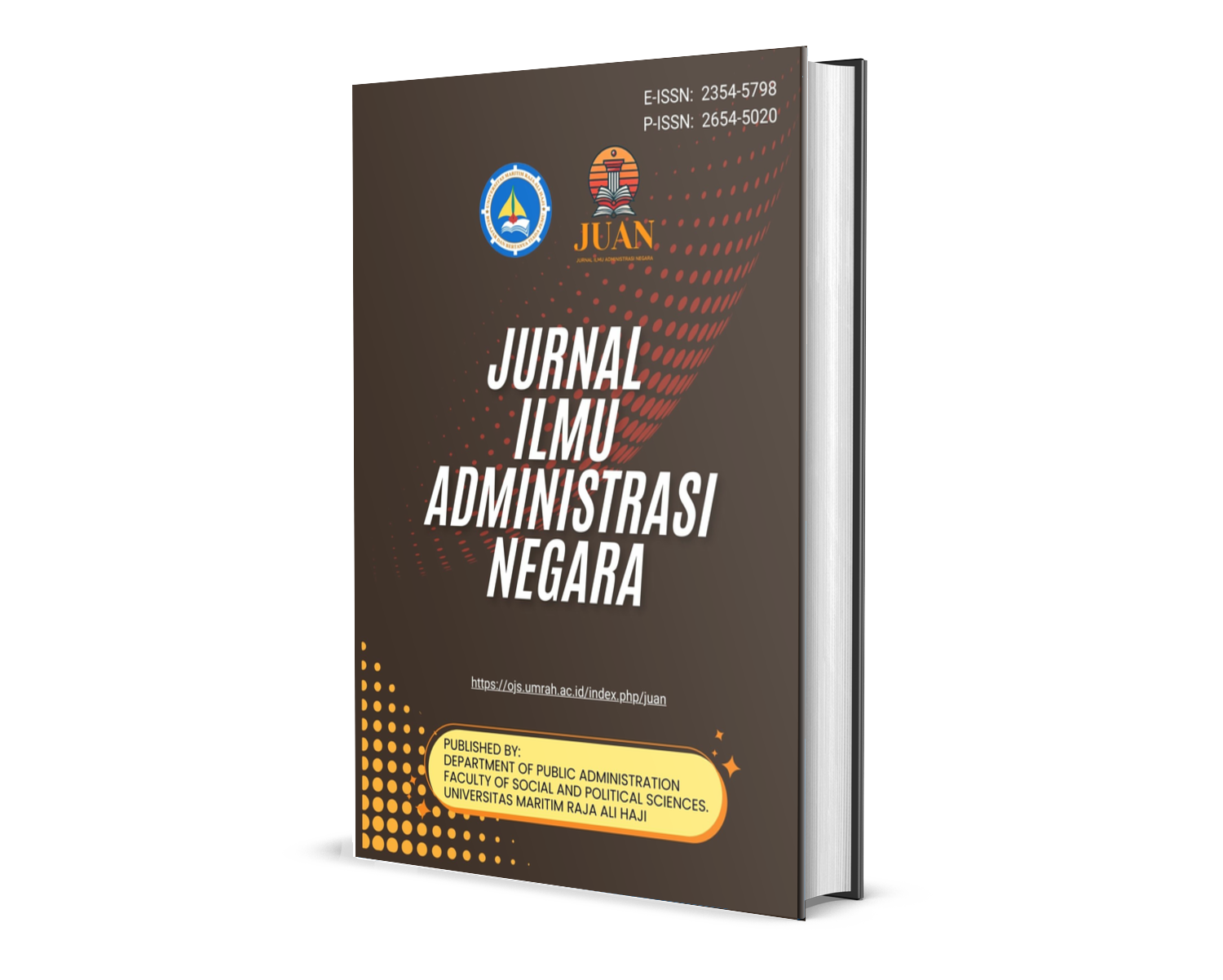Georgia's Tbilisi Municipal Open Government Issues
DOI:
https://doi.org/10.31629/juan.v12i2.7349Keywords:
Open Government, Transparency, Civic EngagementAbstract
This study aims to analyze the key issues of Tbilisi open government. Tbilisi plays a major role in open government in Georgia as the only local government selected for the OGP Local Government Pilot Program. Qualitative approaches and bibliometric analysis methods are used in this study. The data used were obtained from the Google Scholar database through Publish or Perish with keywords: Tbilisi information access, Tbilisi transparency, Tbilisi participation, and Tbilisi collaboration. Data selection used Mendeley, while the bibliometric map was obtained from VOSviewer. The findings of this study show that the study of open government in Tbilisi is fluctuating and not very popular. There are 86 relevant articles and 80 topics in the period 2011-2024. The main topics of focus are: challenge, opportunity, education, development, security, energy, policy, reform, civil society, evaluation, partnership, and program. Meanwhile, current and potential topics: technology, smart governance, government maturity, culture, tourism, digital information, public health, green economics, participatory budgeting, budget processes, reporting, standards, inclusiveness, agricultural sector, equality, and gender. Tbilisi is currently focusing on their five open government commitments: Smart Map civic activity portal, participatory budgeting, access to services and civic engagement, transparent governance, and city hall transparency.
References
Afandi, S. A. (2024). Local Open Government Strategi Reformasi Administrasi Publik. Depok: RajaGrafindo Persada.
Afandi, S. A., Afandi, M., & Erdayani, R. (2023). Local Open Government: Studies in West Nusa Tenggara, Indonesia. Jurnal Administrative Reform, 11(2), 85–98.
Afandi, S. A., Erdayani, R., & Afandi, M. (2024). Open Parliament: Study from Indonesia and Philippines. Journal of Governance and Social Policy, 5(1), 126–147.
De Blasio, E., & Selva, D. (2019). Implementing Open Government: A Qualitative Comparative Analysis of Digital Platforms in France, Italy and United Kingdom. Quality and Quantity, 53(2), 871–896.
Donthu, N., Kumar, S., Mukherjee, D., Pandey, N., & Lim, W. M. (2021). How to Conduct a Bibliometric Analysis: An Overview and Guidelines. Journal of Business Research, 133(1), 285–296.
Gao, Y., Janssen, M., & Zhang, C. (2021). Understanding the Evolution of Open Government Data Research: Towards Open Data Sustainability and Smartness. International Review of Administrative Sciences, 89(1), 59–75.
Gaviria-Marin, M., Merigó, J. M., & Baier-Fuentes, H. (2019). Knowledge Management: A Global Examination Based on Bibliometric Analysis. Technological Forecasting and Social Change, 140(12), 194–220.
Gil-Garcia, J. R., Gasco-Hernandez, M., & Pardo, T. A. (2020a). Beyond Transparency, Participation, and Collaboration? A Reflection on the Dimensions of Open Government. Public Performance and Management Review, 43(3), 483–502.
Gil-Garcia, J. R., Gasco-Hernandez, M., & Pardo, T. A. (2020b). Beyond Transparency, Participation, and Collaboration? A Reflection on the Dimensions of Open Government. Public Performance & Management Review, 43(3), 483–502.
Ingrams, A. (2020). Administrative Reform and the Quest for Openness: A Popperian Review of Open Government. Administration and Society, 52(2), 319–340.
Ingrams, A., Piotrowski, S., & Berliner, D. (2020). Learning from Our Mistakes: Public Management Reform and the Hope of Open Government. Perspectives on Public Management and Governance, 3(4), 257–272.
Kulsum, U., Nurmandi, A., Isnaini, Muallidin, Jafar, M., Loilatu, & Kurniawan, D. (2022). A Bibliometric Analysis of Open Government: Study on Indonesia and Philippines. Journal of Governance, 7(1), 133–143.
Moon, M. J. (2020). Shifting from Old Open Government to New Open Government: Four Critical Dimensions and Case Illustrations. Public Performance and Management Review, 43(3), 535–559.
Moral-Muñoz, J. A., Herrera-Viedma, E., Santisteban-Espejo, A., & Cobo, M. J. (2020). Software Tools for Conducting Bibliometric Analysis in Science: An Up-to-date Review. Multidisciplinar, 29(1), 629–635.
Prastya, D. E., Misran, & Nurmandi, A. (2021). A Bibliometric Analysis of E-Democracy on Government Research. Jurnal Ilmiah Mimbar Demokrasi, 20(2), 71–80.
Ruijer, E., Détienne, F., Baker, M., Groff, J., & Meijer, A. J. (2020). The Politics of Open Government Data: Understanding Organizational Responses to Pressure for More Transparency. The American Review of Public Administration, 50(3), 156–172.
Ruijer, E., & Meijer, A. (2020). Open Government Data as an Innovation Process: Lessons from a Living Lab Experiment. Public Performance & Management Review, 43(3), 613–635.
Schmidthuber, L., & Hilgers, D. (2021). Trajectories of local open government: An empirical investigation of managerial and political perceptions. International Public Management Journal, 24(4), 537–561.
Tai, K. T. (2021). Open government research over a decade: A systematic review. Government Information Quarterly, 38(2), 101566.
Wirtz, B. W., Weyerer, J. C., & Rösch, M. (2019). Open Government and Citizen Participation: An Empirical Analysis of Citizen Expectancy Towards Open Government Data. International Review of Administrative Sciences, 85(3), 566–586.
Downloads
Published
How to Cite
Issue
Section
License
Copyright (c) 2024 Syed Agung Afandi, Muslim Afandi, Rizki Erdayani

This work is licensed under a Creative Commons Attribution-ShareAlike 4.0 International License.
You are free to:
- Share — copy and redistribute the material in any medium or format for any purpose, even commercially.
- Adapt — remix, transform, and build upon the material for any purpose, even commercially.
- The licensor cannot revoke these freedoms as long as you follow the license terms.
Under the following terms:
- Attribution — You must give appropriate credit, provide a link to the license, and indicate if changes were made . You may do so in any reasonable manner, but not in any way that suggests the licensor endorses you or your use.
- ShareAlike — If you remix, transform, or build upon the material, you must distribute your contributions under the same license as the original.
- No additional restrictions — You may not apply legal terms or technological measures that legally restrict others from doing anything the license permits.














